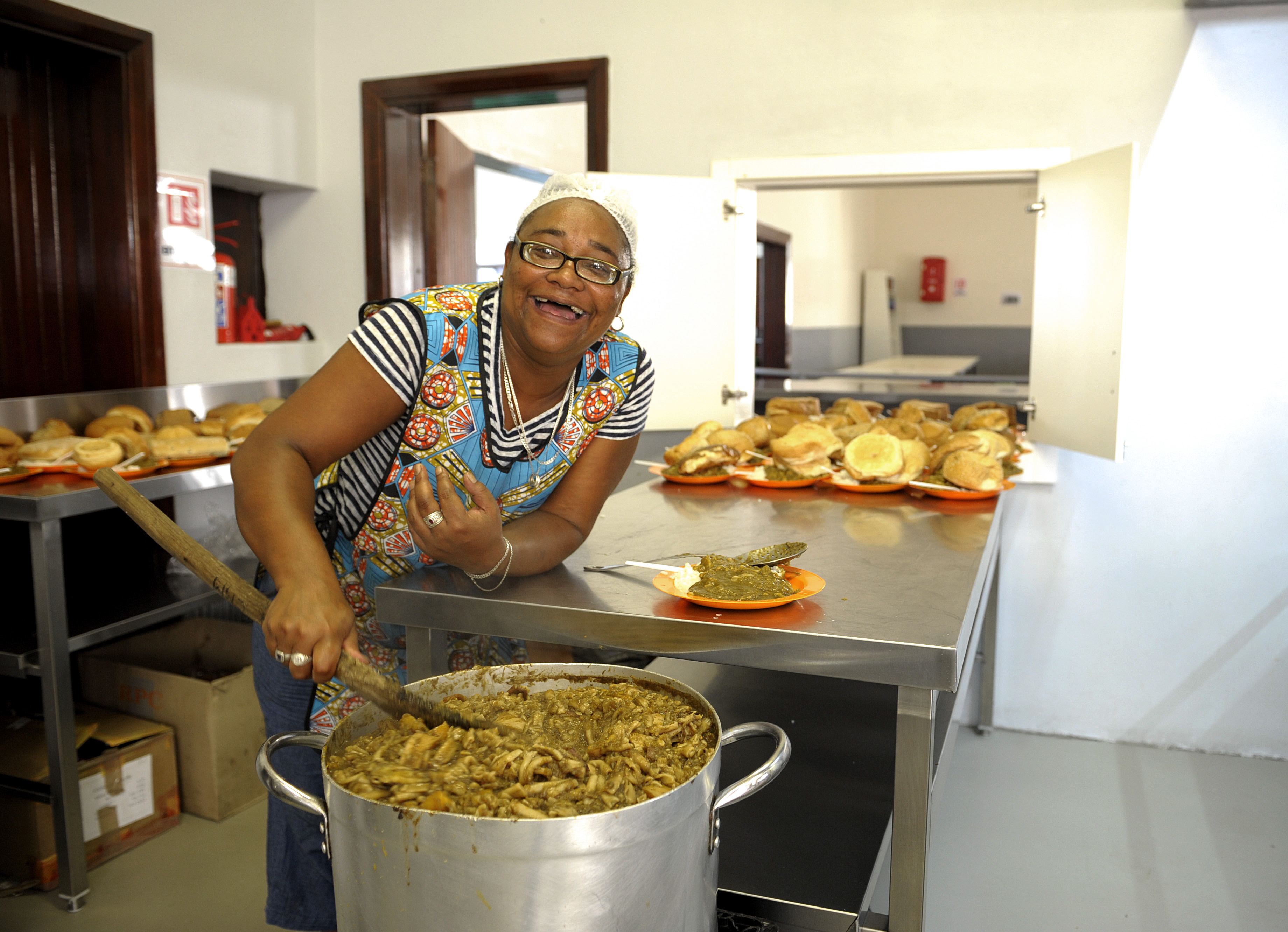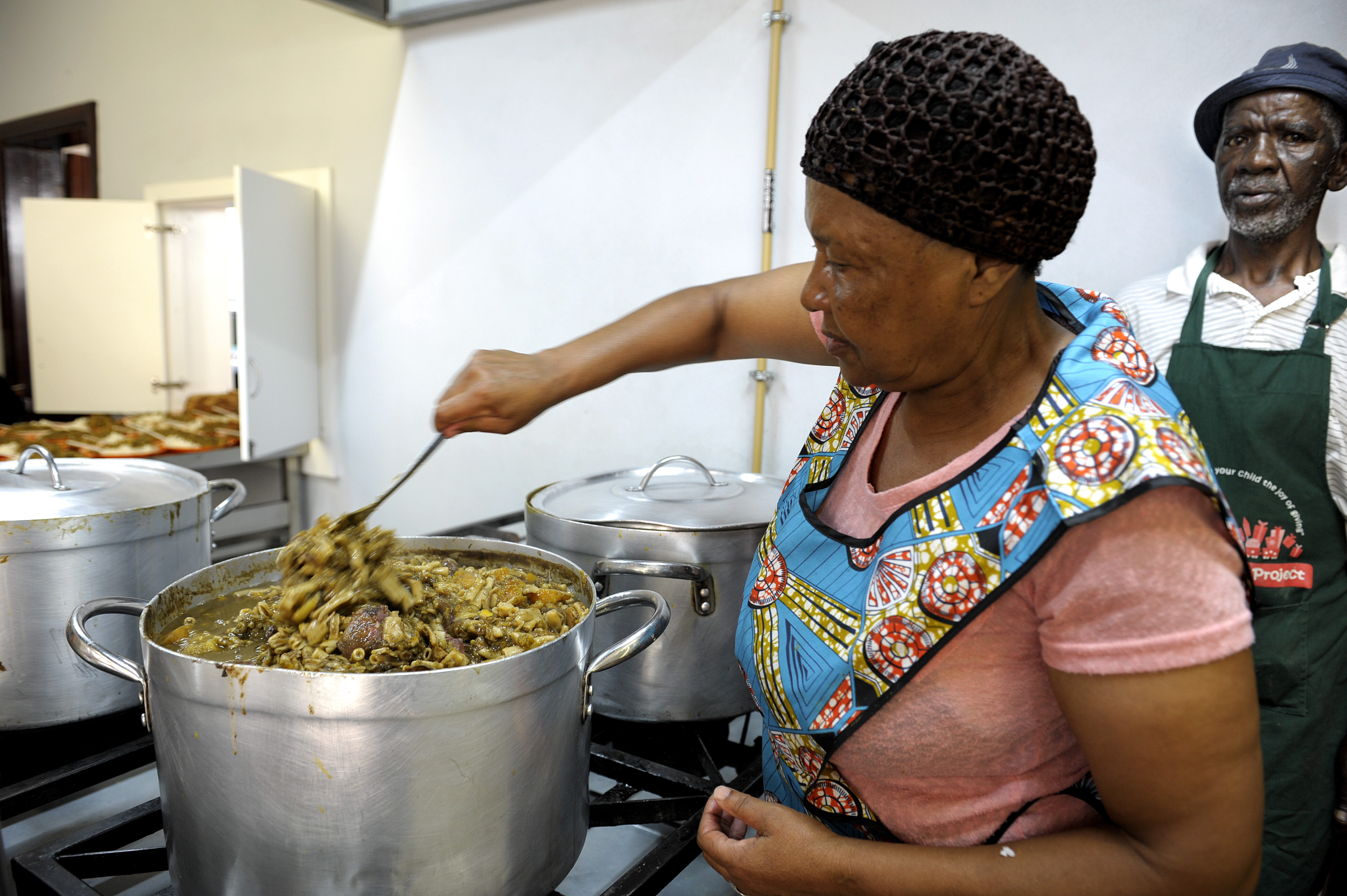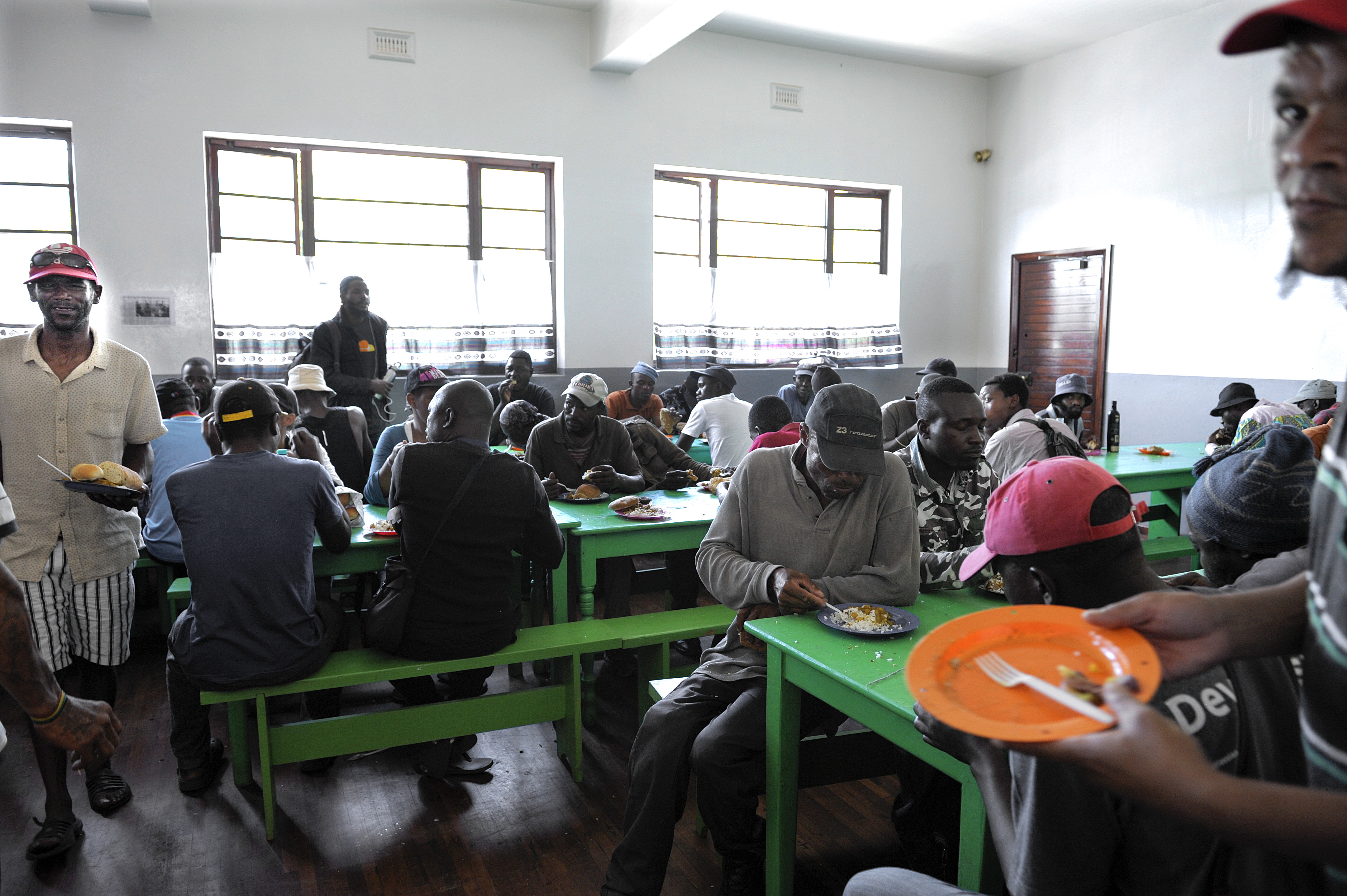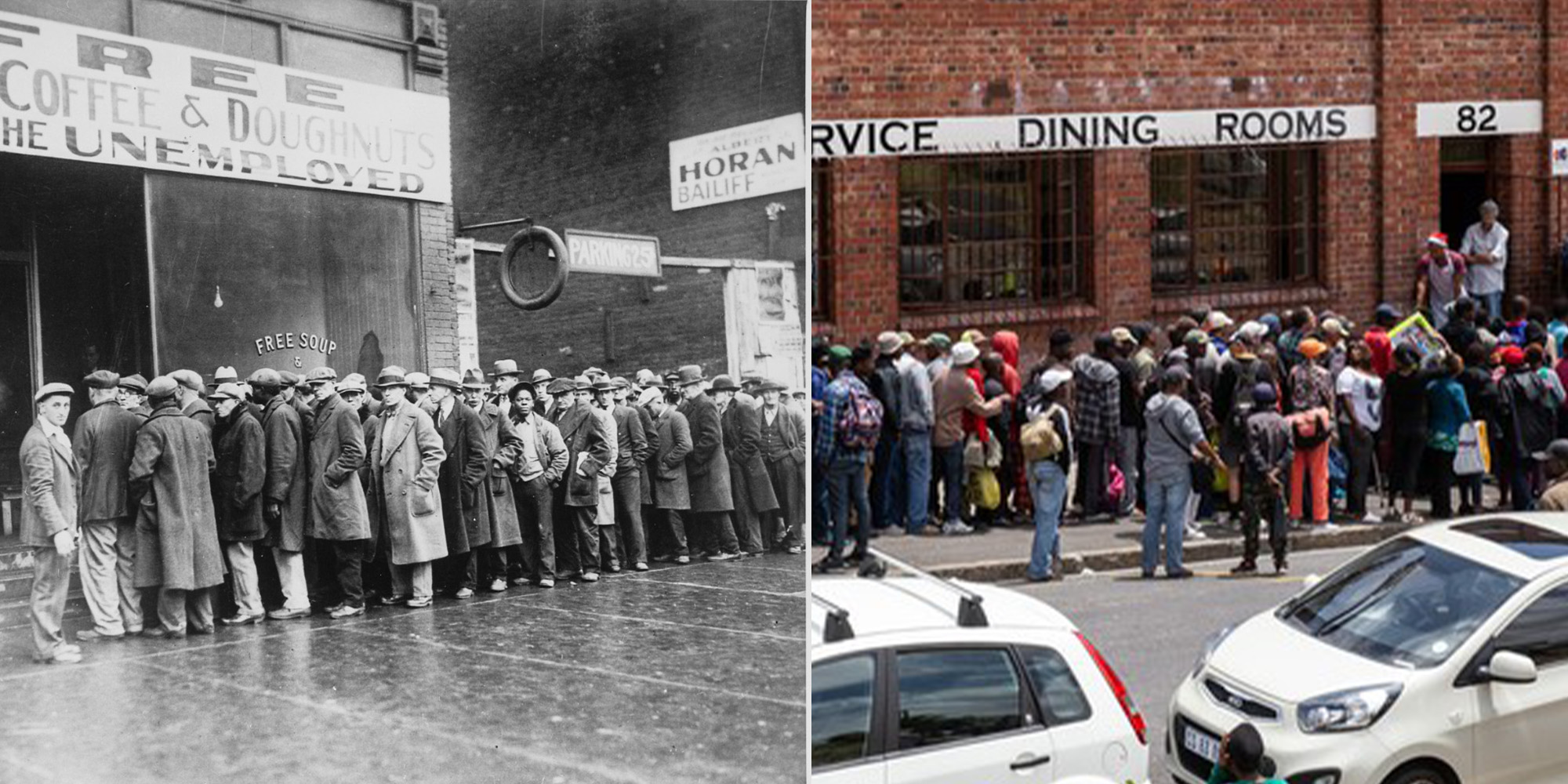So much has come and gone in the 80 years – so much social and political change – since the solid, no-nonsense industrial building was erected to house The Service Dining Rooms in March 1940. Yet, day after day, year after year, the poor have been able to buy themselves a midday meal here for a tiny sum of money.
This cheap meal was once called a “tickey meal”. “Tickey meal” has a better ring to it than a “one-rand meal”, which is how much it costs the just under 300 regular clients who now queue up outside for lunch from around 11am every day to buy themselves a full plate of food.
No one gets turned away here.
“Everyone. We serve everyone,” says Karen Cain, the manager people call Aunty Karen. “Women, children. We always serve them and the trans people first. All religions and races. All ages. All nationalities.”
 Nourishing Our Country - The Service Dining Rooms. We did have consent to take photographs, but were requested to not use people's names.
Nourishing Our Country - The Service Dining Rooms. We did have consent to take photographs, but were requested to not use people's names.
(Photo Joyrene Kramer)
This organisation, initially known as the Cape Town People’s Service Club, was opened on a Wednesday in the autumn of 1933. It was modelled on working men’s clubs of Britain, which were established more to give the unemployed somewhere to go and something to do than to provide them with food. The Service Club was “designed to cope with the deteriorating effect of days, weeks and months of enforced leisure thrust upon men and women and their consequent mental, moral and physical decline”.
These people could read newspapers and books here, or attend classes for such things as tailoring, carpentry, shoemaking, needlework and hat-making. Much of the furniture for the Dining Rooms was initially made by the men in carpentry class.
 We did have consent to take photographs, but were requested to not use their names.
We did have consent to take photographs, but were requested to not use their names.
(Photo Joyrene Kramer)
“Between the classes, tea and coffee and a couple of solid sandwiches are served and during evening sessions cocoa and meat pies,” an early report on the organisation’s activities states. “It is obvious that, in many cases, it is the chief, if not the only, meal of the day.”
The transition from “club” to “dining rooms” happened within two years of the organisation’s life. The first chairperson of The Service Dining Rooms, Bishop Sidney Lavis, said in one of his very first annual reports that people who visited the “club” were small-wage earners, old-age pensioners and others who “could afford only a few pence for their food and are therefore in danger of being undernourished”.
“But in a very important sense,” he said, “the enterprise is not a charity, for those who patronise the dining rooms pay for their meals.”
 Masooda Peterson is the Kitchen Manager responsible for every day's meals.
Masooda Peterson is the Kitchen Manager responsible for every day's meals.
(Photo Joyrene Kramer)
The Service Dining Rooms live in a squat, red-brick, double-storey, purpose-built construction that has its back to Parliament and its face tilted slightly away from the rising sun. The identifying black lettering on a banner of white paint across the front of the building has not changed in 80 years. The sans serif font tells the story of a pared-down age, the years of the Great Depression, which began in 1929 and lasted 10 years.
Google “The Great Depression” and one of the first images that comes up is a black and white photograph showing men in coats and hats queueing outside a building across which a sign has been erected that reads: “Free cup of coffee & doughnuts for the unemployed”. Apart from the hats and coats, the queues outside The Service Dining Rooms at 82 Canterbury Street look very similar: an orderly but urgent press of people waiting for their one square meal of the day.
On Friday last week, Karen Cain was, unusually, alone in the building, with its Thirties-style industrial functionality and solidity.
 The Service Dining Rooms.cooks Regina Philander and Israel Mgizi (Photo Joyrene Kramer)
The Service Dining Rooms.cooks Regina Philander and Israel Mgizi (Photo Joyrene Kramer)
Countless homeless people walked past and shouted or waved their hellos. Cain knows them all by name. Danny and Parker ambled by in their bright orange car-guard vests.
“No stirring,” Cain said in greeting, and Danny laughed.
Parker asked Cain: “What makes coffee sweet?”
Cain said, “I do!” They laughed.
“No,” said Parker, emphatically. “People think it’s the sugar that makes coffee sweet, but if you don’t stir, you don’t taste the sweetness. It’s the stirring that makes coffee sweet.”
He was chuffed with his joke. The two men waved and moved on.
“Danny likes to stir shit,” Cain said, watching them go.
 We did have consent to take photographs, but were requested to not use their names.
We did have consent to take photographs, but were requested to not use their names.
(Photo Joyrene Kramer)
Yet, somewhat surprisingly, the stirring of shit seldom leads to the radical action Cain took when she closed the Dining Room doors last week. She was doing it on advice of the police and after she’d tried to get security from the City to come in and help.
“But they’re overstretched right now,” she told me. “Everyone is. No one knows what to do next. The problem is the refugees. Not all refugees, Cain points out several times. The Service Dining Rooms have always had people from all over Africa and there have never been problems between them and the South Africans who get their lunch here. The problem is the group of refugees that have occupied various streets in Cape Town in their months’ long bid to be resettled in a country that doesn’t have South Africa’s xenophobia problem.
Keeping things orderly and civil at The Service has been an up and down business over the years. According to a pamphlet about The Service Dining Rooms’ history, there was some trouble in the Seventies when staff “increasingly had to deal with ‘spit’ fights”, where children at the Dining Rooms spat a mixture of soup and bread at one another. The children’s dining room, one of the three rooms in which food was served, became “untenable” and was closed down.
 Kitchen manager Masooda Peterson and cooks Regina Philander, Israel Mgizi, Nozuko Klaas and volunteer Marie Slundt at the back. (Photo Joyrene Kramer)
Kitchen manager Masooda Peterson and cooks Regina Philander, Israel Mgizi, Nozuko Klaas and volunteer Marie Slundt at the back. (Photo Joyrene Kramer)
Over the years, the clients have changed as the social circumstances have. Economic downturns, unrest, migration, forced removals, the relaxation of pass law, gangsterism, drought and water restrictions, load shedding — each has, to a smaller or greater degree, contributed towards conflict in the building where The Service Dining Rooms provide their food to the community.
At times security guards have been employed.
“Beyond impatience and drunkenness, fights and orchestrated theft” have flared up over the years, one of the annual reports says.
As Cain shows me through the building – the new toilets for clients, the old service hatch where coffee was once served – she points out the many windows that no longer have handles or stays because they were stolen to be resold to brass scrap dealers.
Fighting and drunkenness and theft haven’t really ever stopped The Service Dining Rooms from serving lunch.
 Nourishing Our Country - The Service Dining Rooms. (Photo Joyrene Kramer)
Nourishing Our Country - The Service Dining Rooms. (Photo Joyrene Kramer)
Threats and intimidation are a different matter though.
Cain has a no-nonsense, bullet-proof façade. She’s been working with the homeless in Cape Town since 1993. She points and orders and organises and instructs in a way that makes people listen, but she never turns her back on a request for help and her affection for her co-workers and clients is palpable. She also has an astonishing ability to remember names.
But she doesn’t tolerate the intolerable.
On Friday last week, a printout was sticky-taped to the front door: “I’m sorry to have to inform you that we are not open today, Thursday, or tomorrow Friday. Karen, Masooda, Regina, Mary Ann and Nozuko take this time to thank all of you for your patience and understanding.”
This is the front door through which the women, children and trans people are allowed to enter and be served first every day. This is the front door that once only white people were allowed to use during apartheid’s rules which were such a clear reflection about which bodies were deemed superior and which inferior. Blacks and coloureds had to enter via a service alley that led to a back door. All the men now queue through that alley and enter via the back door and — normally — things proceed in a regular and predictable way.
But last week, the months of tension between the regular clients and a group of refugees — the ones now roving around the city since they were evicted from the streets around the Central Methodist Church on Greenmarket Square at the beginning of March — who were flagrantly queue jumping, spilled over into fisticuffs.
In its long and reliable history, The Service Dining Rooms has seldom ceased operations and when politics disrupted the flow of things, staff and volunteers adjusted. The fact that there were three days of no lunch last week might be one of the clearest indications that Cape Town is in the grips of one of its most complex social problems ever.
The last time Cain closed the doors for a day was the day after World Homelessness Day in 2019 when someone came in demanding a product or service the Dining Rooms doesn’t, and never has, provided. Things got edgy. The regulars told him to calm down and he threw a plate of food in Cain’s face.
“I said, ‘I won’t have this’. Closed down the next day,” Cain said. “Though, generally, people are very polite.”
Every time I’ve been at the Service Dining Rooms around lunch time, I’ve been struck by this: the patient and fairly orderly queuing, the jokes and familiar exchanges between the kitchen staff, the volunteers and the clients, and the almost bankable regularity of thanks muttered or shouted or gestured once a plate of food has been received.
 Lunch time at The Service Dining Rooms. (Photo Joyrene Kramer)
Lunch time at The Service Dining Rooms. (Photo Joyrene Kramer)
What endures?
When Doris Syfret — who might in this day be described as a bleeding heart, a do-gooder, a privileged woman with nothing better to do with her time than dish out charity — decided to set up a “service club” in the early 1930s, where the unemployed could come to read, take classes and keep busy, did she imagine her efforts would last into the second decade of the next century? Or was she hoping to just make a material difference in the economic press of the Depression years?
Syfret, one of the daughters of one of Cape Town’s leading financiers, ER Syfret, set up her club in 1933 on the corner of Roeland and Canterbury Streets, within view of the grand Parliament buildings and on the main drag the past three presidents have driven down in their black cars with blue lights for the opening of Parliament and the State of the Nation Address.
Syfret’s niece, Patricia Martin, is quoted in The Service Dining Rooms history pamphlet as saying: “I remember Aunt’s story of how she admonished a beggar for being drunk and he responded that he could always get a drink for a tickey, but not food. That set the price of the meal offered at the Dining Rooms and Aunt would never agree to increasing the price.”
 Lunch at The Service Dining Rooms. (Photo Joyrene Kramer)
Lunch at The Service Dining Rooms. (Photo Joyrene Kramer)
Syfret, who was described as “a hard worker, good dancer and fun at a party” by one of her co-workers, was a persuasive and tireless worker in the organisation she started, and only stopped her toiling there in the year of her death, 1977, when the Dining Rooms had been going for 44 years.
Whatever her powers — whether charmingly persuasive or mildly domineering or bullishly tenacious — perhaps those 40 years of ceaseless dedication is what was needed for the endurance and predictability of a feeding service for the poor of this city that has outlasted international catastrophes, an inhumane regime, the advent of democracy and the ongoing, bone-grinding deprivation that is embedded in our country’s story.
For 87 years, The Service Dining Rooms has served lunch. First to the elderly and unemployed of the 1930s and 1940s when unemployment stood at one third of the workforce, almost exactly what it is today. Then increasingly to the women — and the children of women — who needed to work in the 1950s and 1960s to help ease the family burden of poverty.
The Dining Rooms served the residents of District Six, and then, when thousands of those who were not white were relocated during the forced removals, the Dining Rooms took the service to them kilometres away on the Cape Flats. They took their feeding services to the townships in the Seventies. They fed the floods of people coming into the Western Cape from the Eastern Cape in the 1980s.
In 2019, they served 48,000 meals from January to December. In 2020, from the middle of January to the first week in March they have served 10,384 meals. The demand keeps increasing.
The Service Dining Rooms has fed and fed and fed and fed. Through economic upturns and downturns, through depression and recession, through unrest and removals. Through marches to Parliament. Millions — literally millions — of meals have been served to the indigent by The Service Dining Rooms for almost nine decades.
The 20th century proved that poverty is in for the long haul.
An unassuming building in one of Cape Town’s oldest streets stands similarly, and implacably, firm footed.
“Are you serving today?” I WhatsApp Cain on Monday morning, wondering whether they’re open again and, if they are, whether the latest round of load shedding is disrupting cooking.
“Yes,” she said, “99 at coffee time today.”
From 11am, the lunch queue will start forming in earnest again.
Because hunger endures.
And lunch at The Service Dining Rooms endures. MC
The historical detail for this article was sourced from an historical booklet called The Story of The Service Dining Rooms, which was published in 2005.
Maverick Citizen continues to publish a number of articles of food waste, food security, food redistribution and access to food.




 SA Harvest - Nourishing Our Country - Cape Town. The Service Dining Rooms.
(Photo Joyrene Kramer)
SA Harvest - Nourishing Our Country - Cape Town. The Service Dining Rooms.
(Photo Joyrene Kramer) 